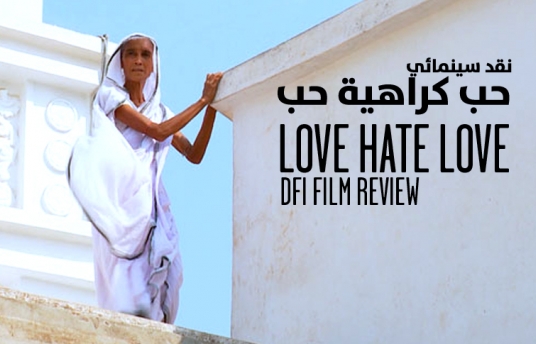DFI Film Review: Love Hate Love (2011)
May 02, 2011

Written by Reem Saleh, New Media, DFI
Film: Love Hate Love
Year: 2011
Directors: Dana Nachman and Don Hardy
Executive producer: Sean Penn
Genre: Documentary
“I’m scared”. These are the last words Peter Alderman emailed to his sister following the surreal images of the twin towers falling before the eyes of the world on September 11, 2001. Sharing a similar fate, but this time in England while riding a bus, was 32 year old Miriam Hyman. Ben Tullipan, meanwhile, never imagined he wouldn’t walk the same way again after a car bomb exploded near him in Bali. These innocent people are victims of terrorism, and have left behind devastated families immersed in sadness who have found it difficult to not only survive these ordeals, but to forget how their lives were altered in a single moment. They have, however, made a choice that will transform the destiny of many.
'Love Hate Love' - Trailer
إعلام فيلم حب كراهية حب
With Sean Penn as executive producer, supported musically by U2, we know that we are about to embark on a very real, very human experience. Alongside the talented directors Dana Nachman and Don Hardy, they offer us a noble lesson of endurance through the stories of three survivors of terrorism.
The film opens with a song from Uganda that conveys an inspirational voice. The camera then travels into the serenity of the countryside, which will all too soon be disturbed by the atrocities human beings are, unfortunately, capable of. Behind those hills our journey starts, ultimately encompassing different corners of the world, where pain and suffering become one with the universe.
People, when faced with grief, have a choice to make: drowning in their own despair, or moving on with their lives. And some, like the three families of this documentary, have refused to become twisted by hate and decided to, instead, use their love for others to combat the hatred that took their loved ones away in the first place.
In Uganda, the aftermath of 30 years of civil war has left behind a generation that’s not able to function properly, because their memory is imprinted with the most horrifying of scenes. How can one forget seeing all their family members murdered in their presence? Or worse, when they were forced to kill? These are the people Peter’s family decided to support, in an effort to assist the people of Uganda in overcoming their post-traumatic stress disorders. Peter’s family wanted them to receive the proper care that will enable them to wake up in the morning with a purpose.
Miriam’s sister, Esther, remembers the first time Miriam wore glasses: the first time she saw things through her new eyes, and when she started drawing to share the blessing of nature and colours so new to her. From this came the decision to transfer Miriam’s appreciation of life to India, to help develop an eye clinic for children. Because of this, children are being given the chance to see properly – just like Miriam did.
And lastly, Ben, who lost both his legs in Bali, went back to Australia and rebelled against his handicap. He found a reason to go on by giving hope to others like him. Talking with them, comforting them and assuring them that everything will be ok: Ben’s voice, strength and story is what they need to empower themselves once more.
Throughout the film we move from one scene to another, and as stories interrelate in images, one family seems as though they are talking for the other. Highlighted by the parallel development of all three, you end up feeling as if they are one unified voice. It is an inspiring documentary that opens our eyes to the many blessings we have, and shows that no matter who we are and what we’ve been through, there’s always a reason to survive and, more importantly, that there is always room to help this universe become a better place.